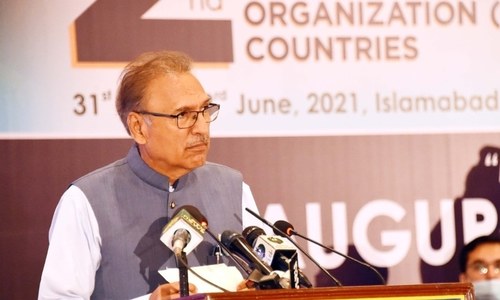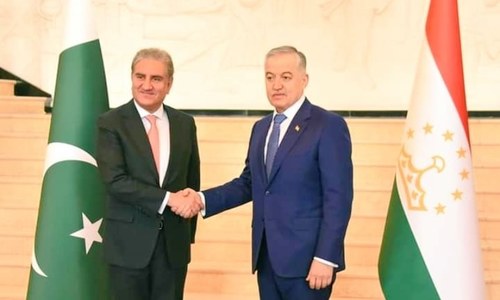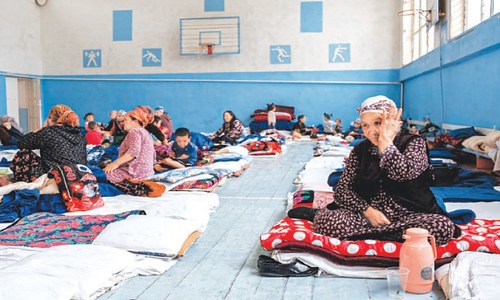Prime Minister Imran Khan on Wednesday stressed the need to improve defence ties with Tajikistan, as the two countries signed memorandums of understanding (MOU) for cooperation in various sectors, including the sale of Pakistan-manufactured arms to the Central Asian country.
The MOUs were signed on the occasion of Tajik President Emomali Rahmon's visit to Pakistan, who earlier arrived in Islamabad on a two-day visit and was received at the Prime Minister House where he was given a guard of honour.
Addressing a joint press conference at the Prime Minister's Office with the Tajik president after their one-on-one meeting and a ceremony where various MOUs were signed, the premier said: "It is very important to improve our defence ties".
He added that the two leaders had also "discussed and signed MOUs on how to meet Tajikistan's requirement for the kind of weapons that Pakistan makes."
The prime minister said that in his meeting with the Tajik president, they had discussed a range of topics and the chambers of the two countries had signed agreements that would improve "our trade ties".
The MOUs and agreements signed between the two countries
- Academic Cooperation Agreement between Tajik Technical University named after academician MS Osimi and Indus University of Pakistan
- Agreement on Cooperation between the Chamber of Commerce and Industry of the Republic of Tajikistan and the Quetta Chamber of Commerce and Industry
- Agreement on Cooperation between the Chamber of Commerce and Industry of the Republic of Tajikistan and the Sialkot Chamber of Commerce and Industry
- Memorandum of Understanding between Lahore Chamber of Commerce and Industry and the Chamber of Commerce and Industry of the Republic of Tajikistan
- Memorandum of Understanding between Agency for State Financial Control and Struggle against Corruption of the Republic of Tajikistan and National Accountability Bureau of the Islamic Republic of Pakistan
- Agreement between the Government of the Republic of Tajikistan and the Government of Islamic Republic of Pakistan for Cooperation in the Field of Prevention and Liquidation of Emergency Situations
- Agreement between the Government of Islamic Republic of Pakistan and the Government of the Republic of Tajikistan in the field of Art and Culture
- Memorandum of Understanding between Tajik Institute of Languages, Dushanbe Tajikistan and National University of Modern Languages of Pakistan
- Memorandum of Understanding between Technological University of Tajikistan and Comsats University Islamabad
- Agreement on International Road Transport
- Cooperation Programme between Ministry of Foreign Affairs and Tajikistan
- Joint Declaration on Next Steps in Building Strategic Partnership for Regional Solidarity and Integration
During the briefing on Wednesday, the premier said that the connectivity offered by Gwadar would further lead to strengthening of trade ties in areas such as education and culture.
The premier said that peace in Afghanistan was "very important" for trade and connectivity with Tajikistan to increase. He said both countries shared a concern over Afghanistan delving back into instability with no political settlement after the withdrawal of US forces.
"Our trade will be affected because of [decreased] connectivity if anarchy spreads there and second we fear that terrorism will increase," he said, adding that both leaders had discussed in their meeting to push for a peaceful settlement in Afghanistan.
The second major issue they had discussed was of climate change and global warming since they posed a common threat to Tajikistan and Pakistan due to the two countries depending on glaciers for their water supply, said Prime Minister Imran Khan.
"If the whole world doesn't act on global warming then upcoming generations of both countries will be in danger so we have decided to further raise our voice on climate change."
The Tajik president also noted the measures taken by his country to combat climate change and preserve glaciers such as calling for declaring 2025 as the "International Year of Glaciers Preservation" to which Prime Minister Imran Khan also affirmed Pakistan's support.
Speaking on other regional issues, Prime Minister Imran stressed that the potential of the whole area could only be fully reached when there was peace in the region, pointing to Pakistan's relations with India.
He reiterated in line with comments he made previously that Pakistan could not normalise its relations with India until it revoked its actions of August 5, 2019 in Indian-occupied Kashmir which had stripped it of its special status.
"If our relations don't improve then the loss from this will be to India, Pakistan and the whole of Central Asia because the whole region can be connected," he said, adding that if relations with India were normalised then Pakistan stood at a "pivotal place" to connect the whole region.
Rising Islamophobia
The two leaders also discussed issues surrounding Islamophobia and the reasons why it continued to spread. Prime Minister Imran Khan said that blasphemy against the Holy Prophet (peace be upon him) and linking Islam with terrorism were the main reasons for its spread.
The premier also specifically pointed to the MOU signed between the NAB and Tajikistan's corruption bureau as "very important" because he said there was a need to raise a voice against money laundering and illicit financial flows from countries like Pakistan and Tajikistan.
The Tajik president, meanwhile, said that Wednesday talks had been held in a very "friendly atmosphere" and Tajikistan was satisfied with the outcome of the negotiations. "Tajikistan recognises the friendly country of Pakistan as a reliable and trustworthy partner on the international stage," he said.
He added that the signed MOUs would strengthen the legal framework of bilateral relations between the two countries and also discussed how cooperation could be increased in investment, trade, agriculture, connectivity and healthcare.














































